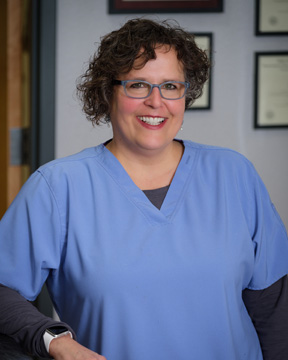
Danielle Johnson 288

Photo by Suzanne Wynveen
Dr. Danielle Johnson, a veterinarian in Wisconsin, worries that reported changes at the U.S. Department of Agriculture are a blow to the veterinary profession.
The first day of veterinary school was exciting, wasn't it? I still remember several details of the speech Dr. Ted Valli, University of Illinois dean, gave us in his greeting. With good humor and complete seriousness, he taught us the correct pronunciation of "veterinarian," schooling us that the word has six syllables, not five, as in "vetrinarian."
Dean Valli also explained what it means to be part of a profession. Before that day, I did not appreciate that I was about to learn a language, the language of veterinary medicine, and that fluency in this particular scientific language binds us all together as a profession.
I felt pride and awe in an almost patriotic way as Dean Valli described what makes the veterinary profession great. As veterinarians, we play a major role in ensuring the U.S. food supply is safe. We protect human health through scientific research and the prevention of zoonotic diseases. We provide benchmarks for improving animal care and welfare. So, as I read recent Washington Post stories regarding changes in staffing and philosophy at the U.S. Department of Agriculture, I became alarmed. These developments threaten veterinarians’ important role.
In May, The Post reported that the USDA has been promoting changes to the inspection of hog plants that would reduce the number of agency inspectors by 40% and turn some inspection duties over to plant workers. The rules, finalized earlier this week, also eliminate limits on the speed with which plants can slaughter hogs. The speed limit was established to ensure plant worker safety, humane slaughter and adequate meat inspection. Critics, including Dr. Pat Basu, former chief veterinarian for the USDA Food Safety and Inspection Service, told The Post that the USDA is undermining laws that put meat inspection in the hands of federal inspectors.
A July story highlighted a shakeup at USDA research agencies with long-term consequences. Although it may not impact the veterinary profession directly, USDA struck a major blow to its commitment to science when it decided on short notice to force 550 people working for the Economic Research Service and the National Institute of Food and Agriculture (NIFA) to either move from Washington, D.C. to Kansas City or lose their jobs. Two-thirds of the workforce quit. The move ostensibly was to save money, but one has to wonder if it was just a quick way to gut the department. The value of the professional knowledge that USDA is letting walk out the door cannot be measured. NIFA helps to develop farming innovations that adapt to climate change. This disruption could be a devastating setback to that work.
The most demoralizing and damaging change to the profession is the rollback of animal welfare enforcement reported in August by The Post.
That story revealed that welfare citations have declined from 4,944 in 2016 to 1,716 in 2018, under Agriculture Secretary Sonny Perdue, a veterinarian appointed in 2017 by President Donald Trump. More serious enforcement cases have dropped 92% in the same two-year span. A softer "teachable moments" approach (providing corrective instruction rather than issuing citations in the case of a violation) was started in the Obama administration and has caught fire under Trump.
In addition, the August story also detailed cases where USDA veterinarians were kept from doing their jobs. When a USDA team began seizing animals at a fur farm in July 2017 in response to a welfare complaint involving raccoons, Perdue and senior USDA officials intervened and prevented the seizure after an industry group complained. Horse inspectors and veterinarians are finding it increasingly difficult to protect Tennessee walking horses from soring under new USDA guidelines for inspection. The industries that make money from animals are happy with these changes, but demoralized veterinarians are leaving the USDA as a result.
Whether working in a clinical practice or for the government, we should all pay attention when a colleague is prevented from honoring their Veterinarian's Oath. Whether worrying about climate change keeps you up at night or not, we all learned enough in veterinary school to appreciate that continued research and innovation is important for our food supply. Whether you take care of the largest land animals or the smallest pocket pets, I know you feel for the USDA inspector who sees animals suffering in an overheated barn and is blocked from using the law to relieve their suffering.
Now what are we going to do about it?
About the author: Dr. Danielle Johnson earned a DVM from the University of Illinois College of Veterinary Medicine in 2002, and practiced mixed animal medicine until 2009. She owns a small animal practice, Homestead Veterinary Clinic, in Baldwin, Wisconsin.